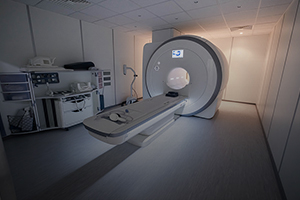Bedside MRI

Magnetic resonance imaging (MRI) has become a vital diagnostic tool, but traditional systems offer limited access to this potentially lifesaving technology. Now, a small, portable system aims to revolutionize the way MRIs are acquired by bringing the imaging system to the patient.
Conventional MRI systems utilize extremely strong magnetic fields and radio waves to capture images inside the body. They consume large amounts of power and can only be used in dedicated, specially shielded rooms to prevent interference from external electromagnetic (EM) sources. They are extremely costly to purchase (upward of $1 million for a low-field unit), install, and maintain; and because a scan can average anywhere from 15 to 90 minutes, patient throughput can be slow.
The new system – called Swoop™ – is not only mobile but also uses lower magnetic field strengths so it can be operated in high-metal-content environments (such as ICUs) safely. Integrated noise cancellation technology automatically detects and corrects for EM interference, and initial scans are available in as little as 30 seconds. The system costs about $50,000.
The benefits of bringing MRI to the patient bedside include faster diagnosis and intervention during the critical first minutes of a medical event. But Swoop also opens up access to MRI technology in smaller rural hospitals and clinics where the cost of a traditional system is prohibitive. The system received emergency use authorization last year to identify COVID-related neurological abnormalities, and the company’s deep learning algorithm for detecting stroke and traumatic brain injury was recently cleared for use.
For information: Hyperfine, 351A New Whitfield Street, Guilford, CT 06437; website: https://hyperfine.io/